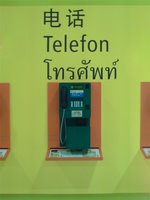Showcasing here, are two clips from Hokkien Xiangju opera “The Bridge of Mother and Son”. Now some of you viewers, especially those from my opera troupe as well as those who had watched Zhangzhou City Xiangju Opera Troupe’s show, might think how come these clips don’t seem familiar. The version featured here is performed by Zhangpu County Xiangju Opera Troupe, and is actually the original version before Zhangzhou City Xiangju Opera Troupe revised the show and made it part of their repertoire.
Allow me to say a bit about the show. The script was written by the late Xiangju opera scriptwriter Tang Yinchang, who is renowned for his works like “The Tale of the Medicinal Stone” and “Protecting the Baby”. His masterpieces usually centred on family-orientated themes which touch the hearts of the common-folks. In this show, the plot is about an unfilial son Liu San, who forgot about his mother’s existence after he got married to Qi’niang. His mother, Madam Xu, got so upset that she was forced to attempt suicide but was saved by the magistrate. The magistrate was furious when he found out what happened and wanted to imprison the young couple, but was stopped by his wife. He then invited Liu San and Qi’niang over to hint them if they had lost anything valuable at home. The young couple counted everything they had at home, but missing out on Madam Xu. The magistrate finally lost his temper and wanted to throw them into jail. It was only at this juncture did Liu San finally recalled he had a mother whom he had not seen for a long time. After crying out to his mother, Madam Xu ran out to see her son, and both hugged together in tears. The magistrate allowed the young couple to bring Madam Xu home, but Liu San and Qi’niang were remorseful for their past actions, and suggested that they be locked up as a punishment. The magistrate agreed and arranged for them to stay for the night in the jail while Madam Xu became their invited guest for dinner.
In my opinion, Zhangpu County Xiang Opera Troupe’s performance standard is rather average, especially in terms of singing. Some of the actors actually sang rather badly. However, I think the troupe do score point in terms of their script, as I believe the late Master Tang was their anchor scriptwriter. Their music is also one of their strength too, and I particularly like their “Zasui” melody a lot.
With the demise of Master Tang, I’m not sure what the direction is for the troupe, and it has been quite a while since there was news from them. Hopefully the troupe will not fall apart just like that, for after all, they had produced quite a few well-received shows in the past.

